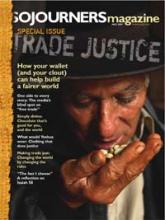On a snowy night in February, Comfort Kumeah, a cocoa farmer from Mim, Ghana, came all the way to Washington, D.C., just to tell a story—and to launch a new chocolate brand into the $13 billion U.S. market. The well-dressed crowd of corporate officers, Christian fair trade advocates, culinary professionals, and journalists gathered at a swanky lounge in the capital to hear Kumeah's story of how her Ghanaian agricultural cooperative, called Kuapa Kokoo, became a Divine Chocolate shareholder, its exclusive cocoa supplier, and a pioneering trade justice organization.
In addition to being a lifelong cocoa farmer, Kumeah sits on Kuapa Kokoo's farmers' union board, teaches a kindergarten class of 128 students in Mim, and is a mother of five, so she knows how to hold an audience's attention. But the youthful 59-year-old kept her enthusiastic explanation of the history and structure of Kuapa Kokoo brief, expressing her pleasure at Divine Chocolate's arrival in the United States. The gathered listeners applauded kindly before returning to their conversation and migrating to the chocolate fountain surrounded by fresh fruit and samples of Divine Chocolate bars.
Divine Chocolate's journey to the United States began when Kuapa Kokoo was founded by cocoa-farming villagers in 1993. The World Bank had just impelled the government of Ghana to allow nongovernmental trading companies to buy farmers' cocoa beans, truck them to ports, and sell them to the government cocoa agency. The change opened the door for predatory merchants and large, unpredictable price swings and put small farmers at an overwhelming disadvantage.
Read the Full Article
